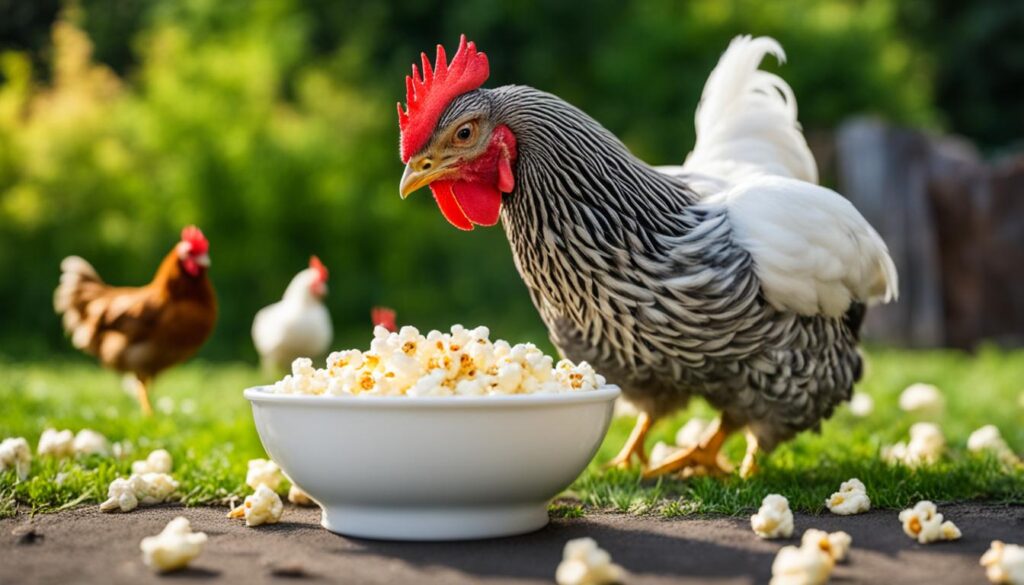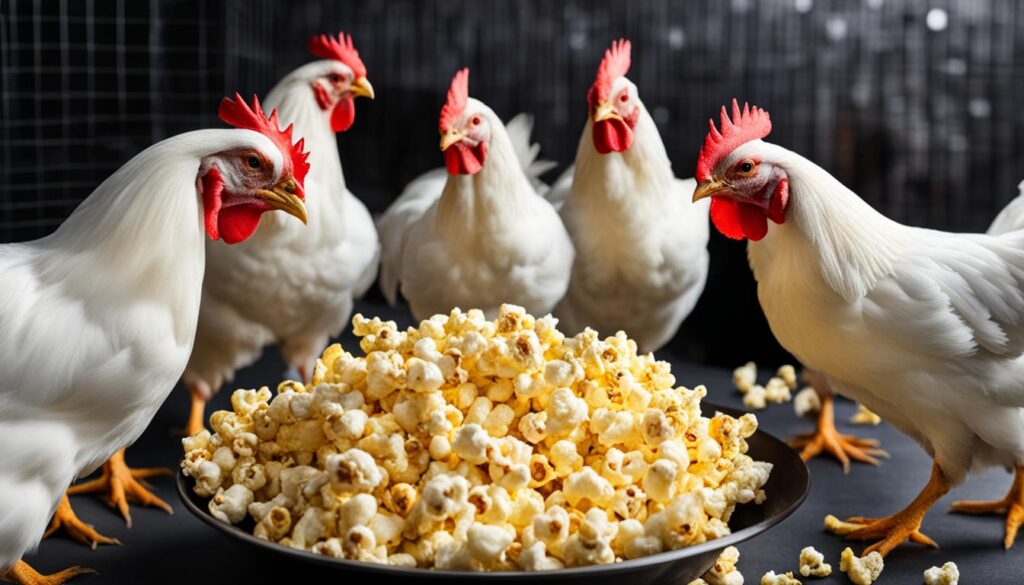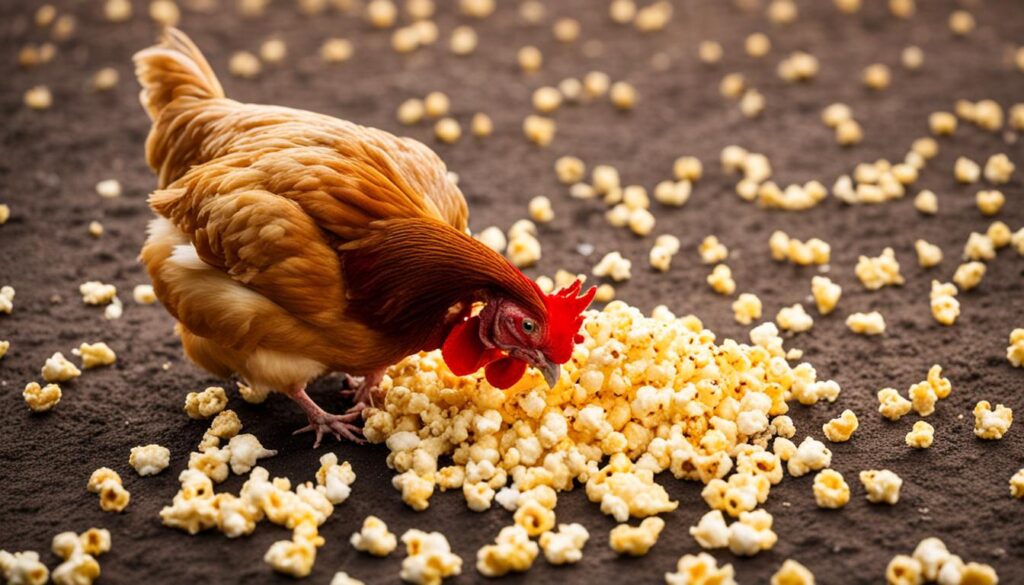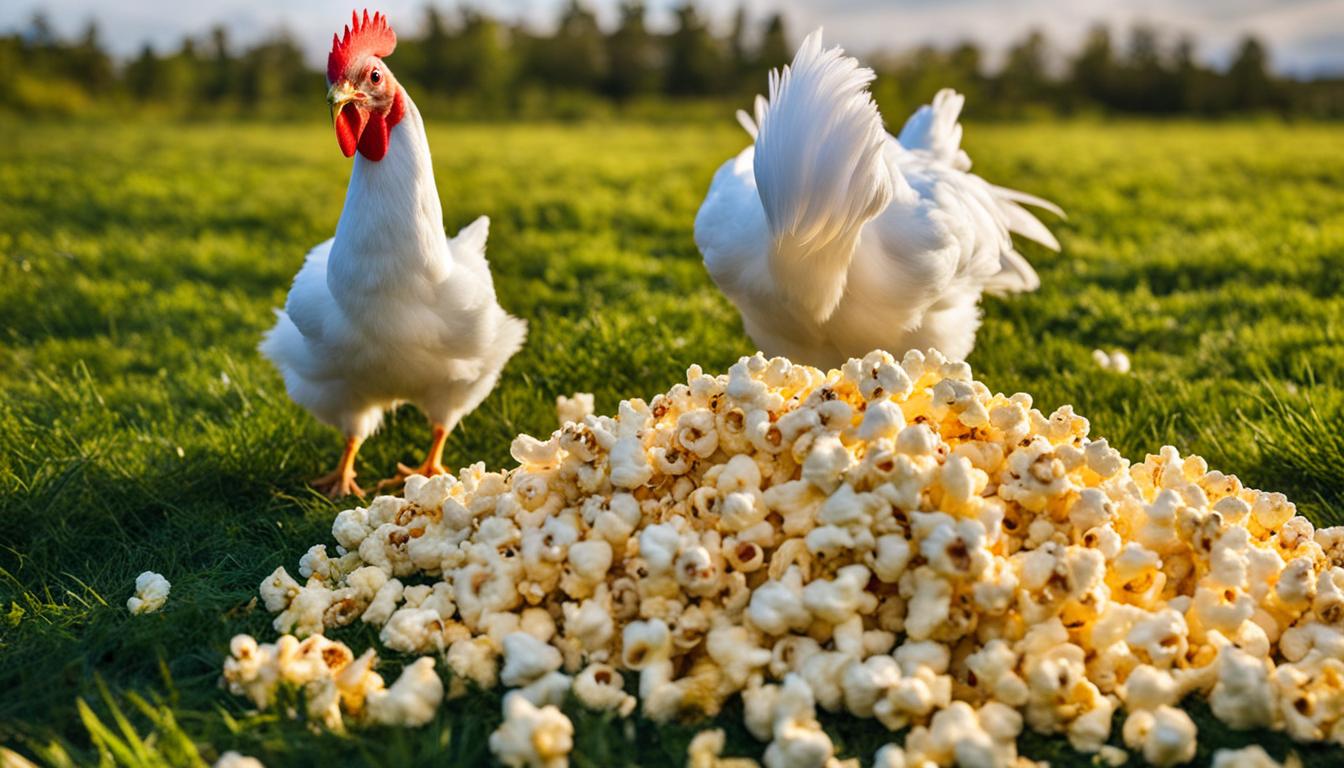When it comes to chicken diets, there are many questions about what is safe and healthy for our feathered friends. One common inquiry is whether chickens can eat popcorn. In this article, we dive into the facts to provide you with a clear understanding of whether popcorn is a suitable treat for your chickens.
Key Takeaways:
- Plain, unseasoned popcorn is safe for chickens to consume in moderation.
- Popped popcorn is a good source of fiber with few calories, making it an excellent treat for chickens.
- Unpopped kernels can pose a choking hazard and may cause digestive issues, so they should be avoided.
- Flavored popcorn with butter, salt, and other additives should be avoided as they can harm chickens’ health.
- Microwaved popcorn is also not recommended due to its high-fat content and lack of nutritional value.
Are Popcorn Kernels Edible for Chickens?
When it comes to feeding chickens popcorn, the question often arises: can chickens eat popcorn kernels? Popcorn kernels can be consumed by chickens, but there are a few considerations to keep in mind.
Unpopped popcorn kernels are hard and can pose a choking hazard to chickens. It’s important to be cautious and prevent chickens from consuming large quantities of unpopped kernels, as it may lead to digestive issues. Popped popcorn kernels, on the other hand, are softer and easier to digest, making them a safer option for chickens.
To ensure the safety of your chickens, it’s crucial to feed them plain and unseasoned popcorn. Flavored popcorn with additives like butter, salt, or other seasonings should be avoided as they can be harmful to chickens’ health. If you’re looking to provide your chickens with raw corn, fresh corn on the cob or frozen corn kernels are better alternatives.
Can Chickens Eat Salted or Buttered Popcorn?

When it comes to popcorn, chickens should stick to the plain, unseasoned variety. Salted or buttered popcorn is not suitable for their diet and can pose potential dangers to their health. While we humans enjoy the savory taste of salt and butter on our popcorn, these flavors can have adverse effects on chickens.
Feeding salted popcorn to chickens: Chickens have a low tolerance for sodium, and consuming excessive amounts of salt can lead to electrolyte imbalances and kidney damage. Salted popcorn contains high levels of sodium, making it unsuitable for chickens. It’s essential to provide a balanced diet that meets their nutritional needs without the unnecessary addition of salt.
Feeding buttered popcorn to chickens: Butter is high in fat and can contribute to obesity in chickens. A diet that is too high in fat can lead to various health issues, including liver problems and heart disease. Additionally, flavored popcorn with butter often contains other additives that can be harmful to chickens’ health. It is best to avoid feeding buttered popcorn to chickens altogether.
Why plain, unseasoned popcorn is the best option
Plain, unseasoned popcorn is a safe and suitable treat for chickens. It provides them with a crunchy snack that they can enjoy without any adverse effects. However, it’s important to remember that popcorn should only be given to chickens in moderation and not as a staple part of their diet. A well-balanced diet that includes high-quality poultry feed should be the primary source of nutrition for chickens.
- Plain, unseasoned popcorn is low in calories and high in fiber, making it a healthy treat option for chickens.
- Popped popcorn is softer and easier for chickens to digest compared to unpopped kernels.
- Avoid feeding popcorn to baby chicks as it can be a choking hazard and lacks the necessary nutrients for their growth and development.
By following these guidelines and providing plain, unseasoned popcorn as an occasional treat, you can safely indulge your chickens while ensuring their overall health and well-being.
Can Baby Chicks Eat Popcorn?
When it comes to feeding popcorn to baby chicks, it’s important to exercise caution. Popcorn can be a potential choking hazard for these small birds due to their tiny beaks and throats. It’s best to prioritize their safety and avoid giving them popcorn at a young age. Additionally, baby chicks have specific nutritional needs for their growth and development, and popcorn lacks the essential nutrients they require.
Feeding popcorn to baby chicks can lead to an unbalanced diet, potentially impacting their overall health. Instead of popcorn, it is recommended to provide them with a suitable diet that is high in protein. A starter feed specifically formulated for young chicks is the best option to ensure they receive the necessary nutrients for optimal growth.
As baby chicks mature and reach the age of six weeks, their digestive systems become stronger, and they can handle a wider range of foods. At this point, you can gradually introduce treats into their diet, but it’s always important to prioritize their nutritional needs. Consult with a poultry expert or veterinarian for specific guidance on feeding your baby chicks a balanced and appropriate diet.
Nutritional Implications of Feeding Popcorn to Chickens
When it comes to the nutritional value of popcorn for chickens, there are some considerations to keep in mind. Popped popcorn primarily consists of carbohydrates, with minimal amounts of protein, vitamins, and minerals. While it can be a tasty treat for chickens, it should not be relied upon as a primary food source due to its limited nutritional content. A balanced diet for chickens should include high-quality poultry feed that provides the necessary nutrients for their overall health and well-being.
Feeding chickens too much popcorn can lead to an unbalanced diet, potentially causing health issues. It’s important to ensure that chickens have a varied diet that includes a mix of protein-rich feed, fresh fruits and vegetables, and grains. These foods provide a wider range of essential nutrients that chickens need to thrive. Popcorn can be a fun addition to their diet, but it should be given sparingly to prevent any negative impacts on their nutrition.
One pitfall of feeding popcorn to chickens is its low protein content. Protein is vital for muscle development, feather production, and overall growth. While popcorn contains a small amount of protein, it is not sufficient for meeting chickens’ daily protein requirements. Therefore, it’s crucial to provide chickens with a balanced and complete diet that includes adequate protein sources, such as poultry feed or other protein-rich treats specifically formulated for chickens.
In summary, while popcorn is safe for chickens to eat, it should be considered more as a treat rather than a staple in their diet. Popped popcorn lacks essential nutrients that chickens need for their growth and development, making it important to ensure they have a well-balanced and nutritionally complete diet. By providing chickens with high-quality feed and incorporating occasional treats like popcorn in moderation, we can ensure that they not only enjoy their treats but also receive the necessary nutrition for a healthy and happy life.
Guidelines for Feeding Popcorn to Chickens

When it comes to feeding popcorn to your chickens, there are a few important guidelines to keep in mind to ensure their safety and well-being. By following these precautions, you can provide your feathered friends with a tasty treat while minimizing any potential risks.
Safety Precautions for Feeding Popcorn to Chickens
1. Moderation is key: While popcorn can be a fun and enjoyable snack for chickens, it should be given in moderation. Too much popcorn can lead to digestive difficulties and potential health issues. Offer popcorn as an occasional treat rather than a regular part of their diet.
2. Plain and unflavored: Make sure the popcorn you give to your chickens is plain and unseasoned. Avoid adding salt, sugar, butter, or any other ingredients that can be harmful to their health. Plain, air-popped popcorn is the safest and healthiest option for your chickens.
3. Soft and fluffy: To reduce the risk of choking, ensure that the popcorn is cooked thoroughly and is soft and fluffy. Avoid feeding unpopped kernels or popcorn that is too hard, as these can pose a choking hazard to your chickens.
Feeding Guidelines for Chickens
1. Variety is key: While popcorn can be a tasty treat, it should not replace a balanced diet for your chickens. Ensure that they have access to high-quality poultry feed, which provides them with the necessary protein, vitamins, and minerals they need for optimal health.
2. Monitor for choking: Whenever you give popcorn to your chickens, it’s important to supervise them during the feeding process. Chickens can get excited and peck at the popcorn too quickly, increasing the risk of choking. Keep a close eye on them to prevent any potential accidents.
3. Consult with a veterinarian: If you have any concerns or questions about feeding popcorn to your chickens, it’s always a good idea to consult with a veterinarian who is experienced in poultry care. They can provide you with personalized advice based on your specific flock’s needs.
Can Chickens Eat Popcorn: Conclusion

In conclusion, when it comes to chickens eating popcorn, it’s important to remember a few key points. First and foremost, plain, unseasoned popcorn is safe for chickens to consume in moderation. It can serve as a tasty treat, providing them with a source of fiber without adding unnecessary calories to their diet. However, it’s crucial to avoid feeding them flavored popcorn with butter, salt, or other additives, as these can be harmful to their health. Additionally, baby chicks should not be given popcorn due to the risk of choking and the lack of essential nutrients for their growth and development.
While popcorn can be a fun and enjoyable snack for chickens, it should not be considered a primary source of nutrition. Popped popcorn is primarily carbohydrates with minimal protein, vitamins, and minerals. Feeding chickens too much popcorn can lead to an unbalanced diet and potential health issues. It’s best to provide them with a well-rounded, nutritionally complete diet that includes high-quality poultry feed supplemented with occasional treats like fruits, vegetables, and grains.
When offering popcorn to chickens, it’s important to be mindful of safety precautions. Popcorn should be plain and unflavored, without added salt, sugar, or other ingredients. Cooking the popcorn ensures that it is soft and fluffy, reducing the risk of choking. It’s also crucial to monitor the chickens while they enjoy their popcorn treat to prevent any choking incidents. By following these guidelines, you can safely treat your chickens to popcorn as a tasty snack while minimizing potential health risks.
Key takeaways:
- Chickens can eat plain, unseasoned popcorn in moderation as a treat.
- Avoid feeding chickens flavored popcorn with butter, salt, or other additives.
- Popcorn should not be the main source of nutrition for chickens.
- Ensure chickens have a balanced diet with high-quality poultry feed as the primary nutrition source.
- Offer popcorn as an occasional snack along with other treats like fruits, vegetables, and grains.
- Follow safety precautions to avoid choking incidents, such as cooking the popcorn and monitoring the chickens while they eat.
Disclaimer:
While the information provided in this article is based on research and expert opinions, it is always recommended to consult with a veterinarian or poultry nutritionist for personalized advice regarding your chickens’ diet and nutrition.
Other Considerations
When it comes to feeding popcorn to our feathered friends, it’s not just chickens who can enjoy this tasty treat. Ducks and geese can also indulge in popcorn, following the same guidelines as chickens. Just remember to offer plain, unseasoned popcorn in moderation to ensure their safety and well-being.
Aside from its nutritional aspects, popcorn can also serve as a source of entertainment for chickens. Watching them peck and play with the fluffy kernels can be a delightful sight. Plus, providing entertainment for our poultry can help reduce stress and create a calmer environment in the coop.
However, while popcorn can bring joy to our birds, it’s important to remember that it should not replace a well-balanced diet tailored to meet the specific needs of each bird species. Popcorn should always be considered a treat and given sparingly, ensuring that their primary source of nutrition comes from high-quality poultry feed and other suitable foods.
FAQ
Can chickens eat popcorn?
Yes, chickens can eat popcorn. However, there are some important considerations to keep in mind.
Can chickens eat popcorn kernels?
Chickens can eat popcorn kernels, but it’s important to be cautious. Unpopped kernels can pose a choking hazard and may cause digestive issues.
Can chickens eat salted or buttered popcorn?
No, chickens should not eat salted or buttered popcorn. The additives can be harmful to their health, and the high fat content in butter can contribute to obesity.
Can baby chicks eat popcorn?
It is not recommended to feed popcorn to baby chicks. Popcorn can be a choking hazard and lacks the necessary nutrients for their growth and development.
What are the nutritional implications of feeding popcorn to chickens?
Popcorn is primarily carbohydrates with minimal protein, vitamins, and minerals. Feeding too much popcorn can lead to an imbalanced diet and potential health issues.
What are the guidelines for feeding popcorn to chickens?
Popcorn should be given in moderation, plain, and unflavored. Cooking the popcorn ensures it is soft and fluffy, reducing the risk of choking.
Can chickens eat popcorn conclusion?
Chickens can eat popcorn as a treat if consumed in moderation. It should not be considered a primary source of nutrition.
Are there other considerations for feeding popcorn to poultry?
Popcorn can also be given to ducks and geese as a treat. It can also serve as a source of entertainment for chickens, reducing stress in the coop.

Leave a Reply